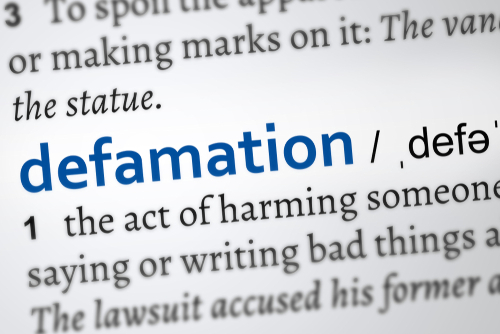Book publisher paraphrases Bullwinkle in response to Michael Avenatti's defamation assertion

Image from Shutterstock.com.
A lawyer for a book publisher is paraphrasing the cartoon character Bullwinkle J. Moose in response to a defamation allegation by convicted lawyer Michael Avenatti.
The Knopf Doubleday Publishing Group responded in an Aug. 26 letter after Avenatti wrote to the publisher to complain that he was defamed in a book about President Donald Trump. The book by journalist Jeffrey Toobin is True Crimes and Misdemeanors.
Law360 has coverage.
Avenatti has been convicted for trying to extort millions of dollars from Nike in exchange for keeping quiet about its payments to young athletes. He faces separate trials on allegations that he stole from adult film actress Stormy Daniels and from other clients. In a civil suit, Avenatti was ordered to pay $10 million to a former law partner who claimed that he was owed money for legal work.
The letter to Avenatti was written by Daniel Novack, senior counsel for Penguin Random House, a publisher owned by the Knopf Doubleday Publishing Group.
“As an initial matter, I understand from your website that you boast a great legal acumen,” Novack wrote. “Nevertheless, few attorneys can claim to be master of all trades, jack of none (paraphrasing Bullwinkle J. Moose). Therefore, your lack of understanding of defamation law can be forgiven, even if you just lost a defamation lawsuit.”
Avenatti had filed the failed suit for Daniels over a tweet by Trump deemed to be nondefamatory “rhetorical hyperbole” by a federal judge. Daniels was ordered to pay $292,000 in attorney fees for the lost suit. Avenatti had also filed a suit for Daniels against Trump to void a nondisclosure agreement
Novack’s letter proceeded to analyze each of Avenatti’s allegations, in a decidedly snarky tone. They include:
• Avenatti disagreed with claims about his personal life and a statement that his presidential run was a “crowning act of lunacy.”
“You assert that Mr. Toobin is not fit to judge you,” Novack wrote. “While we should all take heed of the maxim that those who live in glass houses should not throw stones, legally speaking, we are all free to throw (metaphorical) stones. Or run for president.”
• Avenatti disagreed with a description of him as a “plaintiff’s personal injury lawyer.”
Novack responded: “You complain that you are not a personal injury lawyer. Again, that is not a defamatory assertion. Further, a cursory review of your career indicates that you have in fact brought personal injury claims. … You may reject the label ‘personal injury lawyer,’ but we all contain multitudes. Your argument is therefore existential, rather than legal.”
• Avenatti took issue with the book’s statement that his lawsuit challenging Daniels’ nondisclosure agreement was “absurd” as a “technical legal matter.”
Novack responded: “The fact that you achieved a positive result for your client, despite a weak legal position, is not defamatory. To the contrary—it should be understood as a compliment. Regardless, this statement of the technical legal merits of your case is clearly opinion and, therefore, protected by the First Amendment.”
• Avenatti took issue with the sentence, “While Avenatti was in jail awaiting sentencing for that crime, he was also facing a much larger fraud case in Los Angeles, where he was charged with ripping off both his law partners and his clients.” Avenatti had written, “There is not a single criminal complaint, indictment or charge accusing me of ‘ripping off my law partners,’ let alone one in California.”
Novack said a California indictment had accused Avenatti of falsifying records regarding law firm assets and income, which amounts to defrauding or ripping off law partners.
“As Mr. Toobin explains in True Crimes and Misdemeanors, which I assume you read beyond the paragraphs with your name in them,” Novack wrote, “many colloquial terms for crimes are not actually contained in the criminal code. Just as there is no federal crime of ‘collusion,’ there is no federal crime of ‘ripping off.’ ”
Novack said Avenatti was correct on one point: His lawsuit challenging Daniels’ nondisclosure agreement was filed March 6, rather than March 8. The publisher will correct the date “with all due haste,” Novack wrote.
Write a letter to the editor, share a story tip or update, or report an error.


